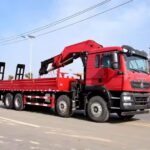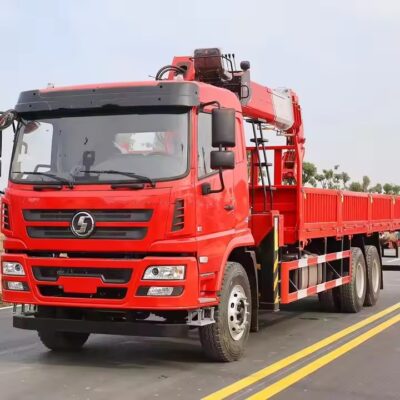In the ever-evolving landscape of global trade and logistics, efficiency and innovation are paramount. The world’s interconnected economies rely on the swift and secure movement of goods, often facilitated by massive containers. As these containers traverse land and sea, a critical link in the supply chain emerges – the process of loading and unloading containers onto trucks for overland transportation. This process has seen a revolutionary advancement with the advent of Cần cẩu nâng bênS, a technological marvel that streamlines container handling on trucks, redefining the efficiency and safety of this crucial operation.
The Evolution of Container Transport:
Before delving into the intricacies of Cần cẩu nâng bênS, it’s essential to understand the context in which they operate. Containers, standardized metal boxes used for the transport of goods, revolutionized the logistics industry in the mid-20th century. These containers are designed to fit seamlessly onto ships, trains, and trucks, facilitating a seamless transfer of goods between various modes of transportation. Tuy nhiên, the challenge arises when these containers need to be transferred from ships to trucks, or vice versa, a process known as intermodal transfer.
Traditionally, this transfer has been conducted using various equipment, such as reach stackers, mobile cranes, or even manual labor. While effective, these methods can be time-consuming, labor-intensive, and potentially hazardous. This is where Cần cẩu nâng bêns step in.
The Ingenious Side Lifter Cranes:
Cần cẩu nâng bênS, còn được gọi là side loaderS, are hydraulic-powered machines designed specifically for lifting and transporting containers. Unlike traditional methods, which require multiple steps and separate equipment for lifting and moving, Side Lifters combine these functions into a single integrated system.
The key innovation of Cần cẩu nâng bêns lies in their ability to lift containers from the side of the truck, hence the name “side lifter.” This lateral lifting capability eliminates the need for overhead clearance, making them ideal for use in areas with limited space, such as crowded ports, urban terminals, and congested industrial yards.

Efficiency Redefined:
One of the most significant advantages of Cần cẩu nâng bêns is their exceptional efficiency. Traditional container handling methods often involve multiple pieces of equipment and a significant amount of manual labor. This process can be time-consuming and prone to delays, particularly in adverse weather conditions. Ngược lại, Cần cẩu nâng bêns drastically reduce loading and unloading times, enabling trucks to swiftly get back on the road, thereby increasing the throughput of goods.
Ngoài ra, the integration of hệ thống thủy lựccát user-friendly controls empowers a single operator to perform the entire process independently. This reduction in manpower requirements not only enhances operational efficiency but also minimizes the risk of accidents and injuries associated with manual handling.
A Safer Future:
Safety is a paramount concern in any industrial operation, and container handling is no exception. Traditional methods, which involve moving heavy containers over distances and heights, can be hazardous for both workers and the cargo itself. Cần cẩu nâng bêns mitigate these risks through their controlled, automated lifting process.
các advanced technology embedded in these cranes ensures smooth and stable lifting, minimizing the chances of accidents caused by shifting cargo. Ngoài ra, the integration of safety features like load monitoring systemcát anti-tipping mechanisms enhances overall operational safety, reducing the potential for mishaps that can lead to costly damages and injuries.
Adapting to the Future:
The logistics industry is in a constant state of flux, driven by technological advancements, shifting trade dynamics, Và environmental concerns. Cần cẩu nâng bêns exemplify this adaptability by offering compatibility with various container types, including standard, high cube, and reefer containers. This versatility ensures that as the types of goods and containers evolve, Side Lifters can accommodate these changes seamlessly.
Hơn nữa, the focus on sustainability and reduced environmental impact is a defining aspect of modern innovation. Cần cẩu nâng bênS, with their efficient operations and reduced need for additional equipment, contribute to a more streamlined supply chain, thereby reducing overall energy consumption and emissions associated with logistics operations.

Embracing the Transformation:
The widespread adoption of Cần cẩu nâng bêns is not merely a technological shift; it represents a paradigm shift in the way we approach container handling and transportation logistics. This transformation extends beyond the mechanical aspects of the cranes themselves; it influences how industries plan, execute, and optimize their operations.
Companies that integrate Cần cẩu nâng bêns into their operations gain a competitive edge in a market that demands efficiency and reliability. By reducing turnaround times and minimizing delays, businesses can provide more accurate delivery estimates to their clients, fostering trust and loyalty. Hơn thế nữa, the ability to adapt to varying container sizes and types enables companies to cater to a diverse range of cargo, enhancing their flexibility and responsiveness to market demands.
The Road Ahead:
Looking ahead, the evolution of Cần cẩu nâng bên continues with ongoing advancements TRONG automation and digitalization. Integrated sensors and smart control systems allow for giám sát thời gian thực của crane performance, enabling predictive maintenance Và minimizing downtime. This proactive approach not only ensures the longevity of the cranes but also prevents unexpected breakdowns that could disrupt supply chains.
Hơn nữa, the marriage of Cần cẩu nâng bên with emerging technologies like the Internet of Things (IoT) Và Artificial Intelligence (AI) holds the promise of even more streamlined and intelligent operations. Imagine cranes that can autonomously assess optimal lifting angles, make real-time adjustments based on changing weight distributions, and communicate with other machines in the vicinity to optimize overall efficiency.
Challenges and Considerations:
Trong khi Cần cẩu nâng bên bring about a plethora of benefits, their integration is not without challenges. The initial investment required to acquire and implement these cranes can be significant. Tuy nhiên, this cost is often outweighed by the long-term gains in efficiency, reduced labor expenses, Và enhanced safety.
Training the workforce to operate and maintain these specialized machines is another consideration. Tuy nhiên, the intuitive design and user-friendly controls of modern Side Lifter Cranes mitigate the learning curve and ensure that operators can quickly become proficient.
Ngoài ra, regulatory frameworkcát safety standards must evolve to encompass these new technologies fully. Governments and industry bodies play a crucial role in ensuring that these innovations are harnessed responsibly and that safety measures are continually updated to match the pace of technological advancements.

In Conclusion: A New Horizon of Efficiency:
The rise of Cần cẩu nâng bên marks a new era in container handling on trucks, underscoring how innovation can reshape traditional practices. These hydraulic marvels have proven their mettle in enhancing efficiency, sự an toàn, and adaptability in an industry critical to global commerce. BẰNG logistics continue to evolve in response to market demands and technological advancements, Cần cẩu nâng bêns are poised to play an increasingly pivotal role.
This transformation is not confined to the mechanics of cranes alone; it influences the broader ecosystem of logistics, from supply chain management ĐẾN customer satisfaction. In an interconnected world where speed, độ tin cậy, and sustainability are prized commodities, the adoption of such transformative technologies becomes a strategic imperative.
As we journey further into this age of innovation, the legacy of Cần cẩu nâng bêns will be marked by their contribution to redefining how goods are transported and handled. By streamlining container handling on trucks, they have unlocked new dimensions of efficiency and safety, paving the way for a future where logistics are not just a support function but a competitive advantage in the global marketplace.









